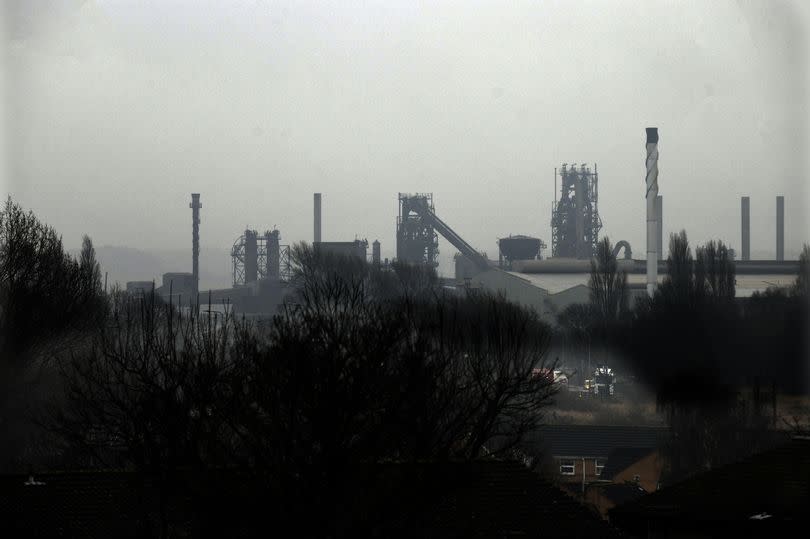How councillors reached decision on Scunthorpe steelworks electric arc furnace

British Steel's proposal for an electric arc furnace (EAF) at its Scunthorpe steelworks has been given planning permission - but only just.
Fears of more than two thousand job losses, UK steel's sustainability, and the suggestion that Teesside is an enemy to Scunthorpe featured in the North Lincolnshire Council special meeting. The steelworks currently employ more than 3,200 people.
Planning officers had recommended approval. When the vote came, it split four-apiece, leaving chair Cllr Nigel Sherwood's position to decide it.
Read More:
Man who had 'no symptoms whatsoever' credits routine bowel cancer screening test for saving his life
British Steel's president and CEO Xijun Cao welcomed the decision. "We’re extremely pleased to have received planning permissions to build electric arc furnaces at our Scunthorpe and Teesside sites. It is a significant step forward in our journey to net zero and we thank everyone who has supported our plans." British Steel has started preliminary talks with trade unions about electrification, and has promised to support employees affected by its decarbonisation plans.
British Steel plans £1.25bn investment to become more sustainable, replacing its two Scunthorpe coke blast furnaces, with EAFs. The Scunthorpe EAF could be running by December 2025. Scunthorpe's blast furnaces will continue until it is fully operational.
'No workers' voice' - 'putting the cart before the horse'
GMB's national Charlotte Brumpton-Childs spoke on behalf of all three unions. A former steelworker, she said it "potentially puts Scunthorpe steelworks on a route to two thousand job losses". "The main point that we want to put forward is that there's no workers' voice that's part of the plan put to the committee."
"We have had meetings with the business, but it's all very much broad picture," she said. "Applying for planning before consulting, we believe is putting the cart before the horse.
"What's being proposed here will have a potentially devastating impact on the workforce and the wider community." She asked for deferment until workers had been properly consulted.
British Steel's chief commercial officer Alan Bell said it was the third largest carbon emitter in the country. Many customers were signed up to Steel Zero, publicly committing to procure 50 per cent steel from sources on the net zero pathway by 2030. "It's not an issue for the next decade, it's an issue we face regularly," he said. "To stand any chance of maintaining our market share, we must be able to demonstrate progress on low carbon."
Mr Bell asserted the same quality product would be produced, but accepted the shorter process of an EAF "will inevitably require fewer jobs". "We're not able to put a definitive number on when we move to the EAF," he said, before further detail is worked out.

"This project is focused on creating a financially sustainable British Steel," he said. A second British Steel representative said public consultation events were held before the application and feedback "has been generally positive".
'Teesside are our enemies' - council leader attacked for 'scare tactics'
A letter from Scunthorpe's MP Holly Mumby-Croft said an EAF would "bring numerous benefits to the area". But she stated: "Any EAF that's built in Scunthorpe should be complementary, rather than replace the blast furnaces."
Council leader Cllr Rob Waltham also wanted the blast furnaces to stay, saying it keeps the steel quality and jobs provided. The application demonstrated investment in the area, and he suggested refusal could lead to British Steel switching to Teesside saying: "One of our real enemies here is Teesside.
"They would happily take jobs away from this community. That's something I hope you're very aware of because they're actively coaxing investment from British Steel all the time."
To read the latest public notices in North Lincolnshire, click here.
The remarks were later criticised by some planning committee councillors. "The leader of the council using scare tactics. That's totally wrong, stop frightening people," said Cllr Mick Grant.
Frodingham Ward Cllr Tony Ellerby's called in the application. He did so "to make it a public domain discussion". "Representing the people of Frodingham, I'm hoping there won't be any job losses whatever the outcome of this discussion is."
"Decline isn't inevitable, it's a choice. Another future for steel is possible, and it's already happening in other countries," Cllr Judith Matthews said, referencing steel developments elsewhere. Committee member Cllr Chris Patterson proposed approval, stating she could not see planning grounds to go against the recommendation.
Cllr Grant spent 30 years in the steel industry. "In my years of working steel, electric arcs, all they did was refine steel," he said, unconvinced by the technology. "I was the primary end for 40 odd years," said Cllr Foster, who had "grave concerns". He argued the move was "primarily about a massive cost-saving exercise" of employment costs.
Cllr John Davison could not support it, either. "From the 1970s, I've watched all our steel plants throught the country either closing down or being turned into rolling mills.
"The construction of a large electric arc furnace here will ultimately result in the full closure of our furnaces and with it the real quality steel we are as a town famous for." He later said: "I believe that our steel industry is being sacrificed at the altar of net zero."
"By closing down our blast furnaces, all we're doing is moving our emissions elsewhere." Cllr Max Bell said it was "not a sustainable position" that the UK would be the only G20 major economy unable to make its own virgin steel.
He also raised that the only S106 condition is a blast furnaces decommissioning timeframe. Cllr Bell predicted a tie and urged the chair to not approve. "That decision if he were to take it would hang over the planning committee for the next 10, 20, 30 years."
"Purely on planning grounds and planning grounds looking through the report, I can't see a reason we can refuse it," Cllr Sherwood said.

 Yahoo News
Yahoo News 
